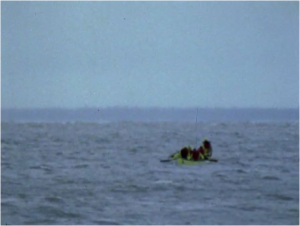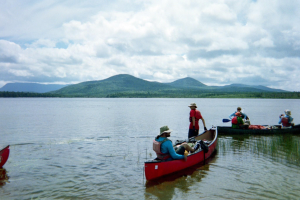On June 19, 2016, while attending a Russian summer camp, 14 children aged 11-15 (out of 47 participants) perished while boating on a large lake during a summer camp activity. The boats overturned during an advancing storm. The water temperature is estimated to have been in the range of 45-50 degrees F.
See, the story https://www.theguardian.com/world/2016/jun/19/russia-lake-syamozero-karelia-children-die-storm-boating
 A similar tragedy occurred thirty eight years ago in 1978 in Canada, when 12 children and 1 adult, during a school-sponsored trip, perished upon being caught on a large lake under tenuous weather conditions, causing all boats to swamp, forcing all 31 participants into water having an estimated temperature of 46 degrees F.
A similar tragedy occurred thirty eight years ago in 1978 in Canada, when 12 children and 1 adult, during a school-sponsored trip, perished upon being caught on a large lake under tenuous weather conditions, causing all boats to swamp, forcing all 31 participants into water having an estimated temperature of 46 degrees F.
See, the story http://www.gendisasters.com/quebec/12688/ville-marie-qb-canoe-accidents-june-1978
In each case the locals reportedly found the presence of youth in boats on a large lake under the existing environmental conditions to be questionable.
Similar open water tragedies involving Scout units have also occurred, such as a 1982 incident where 4 youth and 2 adults drowned when their canoes capsized due to high waves on a large, cold lake in British Columbia (there have been several similar Scout tragedies).
See, the story:
See, also, this June, 2014 Northern Tier story where members of a Scout crew became swamped under tenuous weather conditions, ultimately requiring rescue:

Finally, this Northern Tier story where several Scout crew’s canoes capsized in a storm, with the Scouts ultimately being rescued by campers on shore.
https://www.pinejournal.com/news/swamped-local-men-help-save-scouts-boundary-waters
These stories reinforce the fact that environment + youth = risk, with the magnitude of risk determined by many factors, include age of the participant, water temperature, type of boat, effect of wind, etc.
And, it is clearly unwise to ignore the dangers of boating on cold water, as discussed in this blog entry:
http://www.riskmanagementinscouting.com/cold-water-the-silent-killer/
 These are factors to which Scout unit participants during open water events, such as at Northern Tier, or Maine High Adventure Base, are not immune, and should take into account during the planning and conduct of any open water activity.
These are factors to which Scout unit participants during open water events, such as at Northern Tier, or Maine High Adventure Base, are not immune, and should take into account during the planning and conduct of any open water activity.
